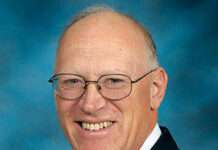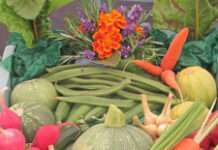Staying home has helped people make wiser food choices, save money
MANHATTAN, Kan. – Nearly 1 in 3 Americans have said that their eating habits became more healthy during the COVID-19 pandemic, according to a study released recently by the International Food Information Council.
“That’s a good thing that has come out of this no matter what age you’re at,” said Kansas State University food scientist Karen Blakeslee. “Making changes in your diet or your eating habits to be healthier can really impact your health in the long run.”
Blakeslee said the trend toward health got a boost by people staying home more.
“Staying home allowed consumers to pull out their recipe books and cook more at home,” she said. “Simply having the time to cook at home allowed consumers to be creative and try new cooking techniques, or dust off an appliance that was rarely used.”
Consumers also have been more likely to try mail-order kits or subscribe to a fresh food service so that they didn’t have to go to the grocery store, according to Blakeslee.
“Time in the kitchen also allowed time for more baking, and many are going to continue baking (after the pandemic has passed),” she said, noting that yeast was among the products that became difficult to find in grocery stores.
“There are people who used to say, ‘I’d like to (bake) some day.’ Well, they got their chance, and many of them decided to learn how to bake yeast bread. It’s a science in itself; it takes some practice to do that successfully.”
Also contributing to healthier eating: Blakeslee notes that 30% of people reported paying closer attention to nutrition facts labels, which now include important information on sugar and sodium content in foods, as well as vitamin D, calcium, iron, potassium and more.
“There is a lot of really good information on there that can help you make healthy food choices,” Blakeslee said.
Blakeslee also noted some ways in which consumers can continue saving money once the pandemic is over, including:
• “Make the choice to eat outside the home only on a special occasion.” Many consumers saved money eating at home while the choices to eat outside of the home were limited.
• When shopping for groceries, choose store brands instead of popular name brands.
• Shop the pantry before heading to the grocery store to prevent unnecessary food purchases.
Blakeslee, who is also coordinator of K-State’s Rapid Response Center for food science, publishes a monthly newsletter, called You Asked It!, that addresses many issues related to food science and safety.
More information on food safety also is available online from K-State Research and Extension.
# # #
Sidebar
Go ahead…Flip for Dessert!
MANHATTAN, Kan. — Food scientist Karen Blakeslee won’t be the one to tell you not to have a piece of cake after dinner.
In fact, she says, “I flip for dessert, too!”
“But I also think about what dessert looks like,” said Blakeslee, coordinator of K-State’s Rapid Response Center for food science. “Instead of a large piece of cake with a simple fruit garnish, cut a smaller piece of cake and add more fruit on the side.”
Thus, ‘flipping’ dessert means reducing the sweet part and increasing the healthy part.
“You will satisfy your sweet tooth while adding more naturally sweet fruit and reducing added sugar intake,” Blakeslee said. “Added sugars in our diet are a leading cause of weight gain, type 2 diabetes and heart disease.”
“Make healthy choices to make every bite count.”
FOR PRINT PUBLICATIONS: Links used in this article
International Food Information Council, https://foodinsight.org
Rapid Response Center for food science, www.rrc.ksu.edu
You Asked It! (newsletter), www.rrc.k-state.edu/newsletter/index.html
K State Research and Extension is a short name for the Kansas State University Agricultural Experiment Station and Cooperative Extension Service, a program designed to generate and distribute useful knowledge for the well being of Kansans. Supported by county, state, federal and private funds, the program has county extension offices, experiment fields, area extension offices and regional research centers statewide. Its headquarters is on the K State campus in Manhattan. For more information, visit www.ksre.ksu.edu. K-State Research and Extension is an equal opportunity provider and employer.
Story by:
Pat Melgares
785-532-1160
melgares@ksu.edu
For more information:
Karen Blakeslee
785-532-1673
kblakesl@ksu.edu





